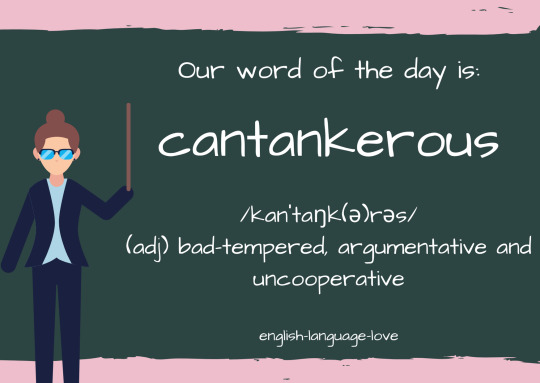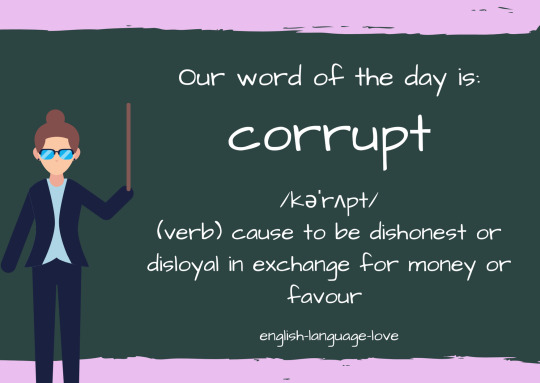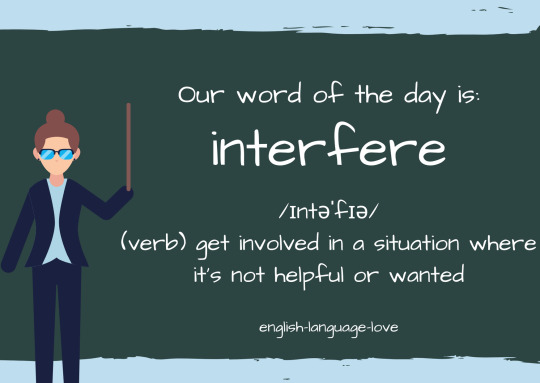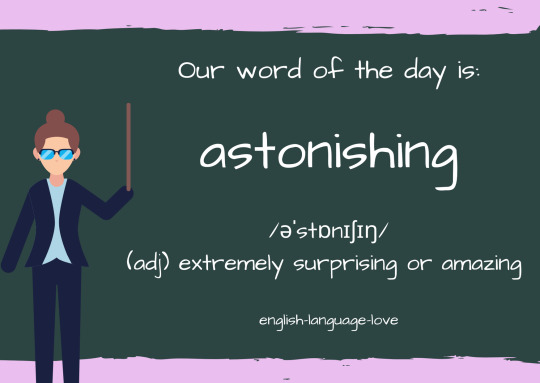Photo

Word of the Day (29.11.20)
cantankerous /kanˈtaŋk(ə)rəs/ - adjective - bad-tempered, argumentative and uncooperative
Related words: cantankerously (adverb), cantankerousness (noun)
He’s an intelligent and accomplished man, but he’s so cantankerous at times that he’s impossible to work with.
She was often described as aloof and cantankerous by her peers.
My cat’s a cantankerous little creature, but I love him anyway.
24 notes
·
View notes
Photo

Idiomatic Phrase - Straight Off the Bat
Straight away.
This idiom comes from baseball, where players must make an immediate decision to run once the ball is hit - that is to say, straight away once the ball is off the bat. You may also hear ‘right off the bat’.
My younger sister good at learning new skills straight off the bat, which was really frustrating when we were kids.
Most people don’t understand English grammar straight off the bat, but it gets easier if you keep studying.
12 notes
·
View notes
Photo

Word of the Day (28.11.20)
elegance /ˈɛlɪɡ(ə)ns/ - noun - quality of being graceful and stylish
Related words: elegant (adjective), elegantly (adverb)
She danced with all the grace and elegance of a frightened elephant.
His elegance was one of his defining features.
Their home wasn’t a shining example of elegance, but it was cosy and comfortable, and their hospitality more than made up for it.
6 notes
·
View notes
Photo

Word of the Day (27.11.20)
approve /əˈpruːv/ - verb - believe that something is good or acceptable
Related words: approval (noun)
Thankfully, both my parents approved of my girlfriend.
He didn’t approve of his daughter’s decision to move to China, but he couldn’t stop her.
I can tell that Amy doesn’t approve, but I don’t really care.
Note: when used to refer to a noun or pronoun, you need to use the preposition of after this verb. If a noun or pronoun isn’t referred to in a sentence, it can stand on its own without it (as in the last sentence).
7 notes
·
View notes
Photo

Word of the Day (26.11.20)
corrupt /kəˈrʌpt/ - verb - cause to be dishonest or disloyal in exchange for money or favour
Related words: corrupt (adjective), corruption (noun)
Just promise me you won’t let the promise of power and fame corrupt you.
He suspected that several of his employees had already been corrupted by outside groups.
Your bribes might have worked on other journalists, but you won’t succeed in corrupting me!
1 note
·
View note
Photo

Idiomatic Phrase - It’s Nothing to Write Home About
It’s nothing special.
If you go on holiday or you go away to work, you might write a letter or an email to let your family know how you are and what you’ve been doing. In such a letter you might talk about something that was really good or really bad, but it’s not likely you’d waste words talking about something that didn’t have much impact on you. Therefore we use this phrase when talking about things that are okay, but not very interesting or special.
Although the food was nothing to write home about, the atmosphere at the restaurant was cheery and the staff were very polite.
It wasn’t a bad experience, but it certainly wasn’t anything to write home about.
7 notes
·
View notes
Photo

Word of the Day (25.11.20)
juxtaposition /ˌdʒʌkstəpəˈzɪʃ(ə)n/ - noun - effect of two things close together creating a contrast
Related words: juxtapose (verb)
The juxtaposition of The King’s resplendence against the dreary post-apocalyptic backdrop created a powerful impact.
The band used major keys in juxtaposition with bleak lyrics.
Despite being brothers, the two of them stood side by side was an odd juxtaposition.
7 notes
·
View notes
Text
It’s Tuesday again! Tell me about the last film you watched. Or you can tell me about your favourite movie, or TV show, or anything at all!
Remember to start your ask with an X if you don’t want any corrections. You can also ask me to keep your message private.
Read about Tell-Me Tuesday here.
1 note
·
View note
Photo

Word of the Day (24.11.20)
descend /dɪˈsɛnd/ - verb - move downwards
Related words: descent (noun)
The feeling of excitement built within her chest as the plane descended - soon she’d set foot in her new home country for the first time.
He couldn’t help but gape as she descended the stairs, her dress swishing and sparkling as she moved.
The dragon descended gracefully and landed on the palace roof.
3 notes
·
View notes
Photo

Idiomatic Phrase - To Sell Like Hot Cakes
To sell quickly.
Everyone knows that cake tastes best when it’s so fresh it’s still warm, so warm (or hot) cakes always sell quickly.
If you want a copy, you’ll have to get up early to preorder it - the limited editions always sell like hot cakes!
I didn’t exactly expect these scarves to sell like hot cakes, but I expected to sell at least some of them at today’s market.
4 notes
·
View notes
Photo

Word of the Day (23.11.20)
diligent /ˈdɪlɪdʒ(ə)nt/ - adjective - showing careful and persistent effort in one’s work
Related words: diligence (noun), diligently (adverb)
She’d described herself as a diligent worker on her job-application, despite the fact she was quite lazy and often careless.
Of all my employees, I’ve noticed those from Eastern Europe are the most diligent.
He was a patient and diligent man, who not only managed to get the job done, but did it well.
4 notes
·
View notes
Photo

Word of the Day (22.11.20)
desultory /ˈdɛs(ə)lt(ə)ri, ˈdɛz(ə)lt(ə)ri/ - adjective - lacking purpose or enthusiasm
A handful of people made a desultory effort at bringing some life to the dance floor.
The market was populated by desultory shoppers wandering from stall to stall.
Though he’d lost his passion for the subject some time ago, he was determined to finish the course, and so he continued to study in a desultory way.
17 notes
·
View notes
Photo

Word of the Day (21.11.20)
appoint /əˈpɔɪnt/ - verb - assign a position or a job
Related words: appointment (noun)
I’ve just been appointed head of the department!
She couldn’t decide who to appoint as the new Shadow Secretary, mostly because all of the ministers were equally useless.
Even though he’d been appointed faculty leader several years ago, he still didn’t feel truly qualified for the position.
4 notes
·
View notes
Photo

Idiomatic Phrase - To Have Bells and Whistles
To have appealing additional features.
Bells and whistles are usually ornamental /ɔːnəˈmɛnt(ə)l/, meaning their purpose is just to look nice; they aren’t necessary for something to work. So when we say something either has bells and whistles or comes with bells and whistles, we mean it comes with extra features. When we say it doesn’t have all the bells and whistles, that means it works, but it doesn’t have features that aren’t strictly necessary.
This laptop doesn’t have all the bells and whistles that the others do, but at least it’s affordable.
Dave’s new car has all kinds of bells and whistles that seem completely unnecessary to me.
10 notes
·
View notes
Photo

Word of the Day (20.11.20)
interfere /ɪntəˈfɪə/ - verb - get involved in a situation where it’s not helpful or wanted
Related words: interference (noun)
She's not a bad friend, but she tries to interfere with my love life all the time, which is quite annoying.
He seems to have the situation under control; let’s not interfere.
There’s no need to get mad at me; it’s my job to interfere when you mess things up!
3 notes
·
View notes
Photo

Quick Grammar Class: The Past Perfect Continuous
We've been looking at perfect tenses recently, and today we're going to continue this by looking at the past perfect continuous. If you're not already comfortable with the present perfect simple, the past perfect simple and the present perfect continuous, you may want to practise those before you try to understand this tense.
Form
The past perfect continuous is formed with had + been + present participle.
I had been learning... (I'd been learning)
He had been cooking... (He'd been cooking)
We had been cleaning... (We'd been cleaning)
As with the present perfect continuous, the negative is formed by placing not after had.
You had not been working... (You hadn't been working / you'd not been working)
She had not been jogging... (She hadn't been jogging / she'd not been jogging)
They had not been sleeping... (They hadn't been sleeping / they'd not been sleeping)
How Do We Use It?
We use the past perfect continuous to talk about things that continued up until a point in the past. Unlike the present perfect tense, the action doesn't continue until now; it stopped at some point in the past or was only true up until a certain point in the past. It is either used to focus on duration of an action in the past or the cause of something in the past.
I'd been learning Italian for over a year when I finally went to Rome.
You hadn't been working at the company for very long when I started.
He'd been cooking and the kitchen was a mess as a result.
She was exhausted because she'd been jogging.
By the time she arrived, we'd already been cleaning for several hours.
They'd been sleeping rough for a few months at that time. (To sleep rough = to sleep on the streets due to being homeless)
That concludes today’s lesson! As always, you can ask me to explain things you aren’t sure about or send me a few sentences to mark if you want.
#grammar#b2#english#learn english#english langblr#language blog#langblr#languages#esl#efl#past perfect continuous#english grammar
5 notes
·
View notes
Photo

Word of the Day (19.11.20)
astonishing /əˈstɒnɪʃɪŋ/ - adjective - extremely surprising or amazing
Related words: astonish (verb), astonishingly (adverb)
Learning to speak seven languages is a truly astonishing achievement!
The fact that he still refuses to admit defeat is frankly astonishing.
The library housed an astonishing collection of old atlases.
7 notes
·
View notes